Stay in the know on all smart updates of your favorite topics.
Are you interested in the experiences of others working in smart city projects and organizations? The Smart City Academy provides available knowledge about smart city projects and can help you with project development. This Smart City Academy page provides you with information and researches about the impact and conditions of smart city projects. Professors, teachers and students study the initiation, management, collaboration and scaling of smart city projects and would like to share these results with you. They do so by organizing events and masterclasses, by developing smart city tools and methodologies and by making research and outcomes accessible. You can find everything here. And the good news is.... You can add your knowledge too! Are you working on Smart City research? Please feel free to share your knowledge in the Academy section, under ‘Other research and theses’. The Smart City Academy is powered by the Amsterdam University of Applied Sciences. If you have any questions, you can contact smartcityacademy@hva.nl
Arnhem food cooperative with Amsterdam roots

In 1901, sixteen dairy farmers in the vicinity of Amsterdam, decided to establish the "Ilpenstein" cheese factory. My grandfather, Piet Nieuweboer, was one of the directors of the cooperative. The reason for collaboration within the cooperative? Cheesemaking traditionally takes place at the farm itself. The cheese factory made it possible to use innovative cheesemaking techniques. Even more important was the collaboration to improve the distribution and marketing of the cheese towards customers.
With the course "Biologisch Tuinieren in de Stad", we have trained almost two hundred new urban farmers in the city of Arnhem. Organic urban farmers with a food garden of half a square meter till half a hectare. It is a dream that these organic urban farmers, and others, will eventually find each other. Our initiative is the establishment and growth of the "Biologische Stadsboeren Coöperatie Arnhem Groen". An organic urban farmers' cooperative focused on economic collaboration in a green Arnhem.
Unmanned systems & sustainability @Formula 1

Unmanned systems; Developments & challenges
<strong>Pieter Elands,</strong> Program Manager Unmanned Systems at TNO, is an experienced manager of people and complex research programs. Pieter will share insights into the latest developments and key challenges in the field of unmanned systems. With a strong background in Aerospace and Defence, responsibility for coordinating research on unmanned systems and extensive knowledge of how unmanned systems are deployed in today’s military operations, the talk will explore technological, organizational, and strategic challenges.
Sustainability at the F1 Heineken Dutch Grand Prix
Dimitri Bonthuis is director Media & Sports Development at SportVibes and currently involved in major events like ABN AMRO Open and F1 Heineken Dutch Grand Prix. At the Dutch GP he is responsible for sustainability. This evening, Dimitri will talk about his experiences with sustainability at the Grand Prix, exploring how he approaches the topic, which innovations have been key, the challenges of driving sustainable initiatives, and how these efforts fit into a broader strategic vision.
21.00 Networking with coffee/tea
The Amsterdam Hunger Game

Learn with the case study Amsterdam to anticipate future food disruptions. Understand the city's food supply chain vulnerabilities is critical for enhancing food resilience. Enhance food resilience in empowerment of people in urban food growing.
Masterclass 3D-printen
Focussessie 3D-printen
Dinsdag 14 oktober 2025
11.00 – 17.00 uur
In deze verdiepende sessie ontdek je concrete toepassingen van 3D-printen.
Tijdens deze focussessie verwelkomen we:
<strong>Viktor Valk</strong>, Regional president bij Freemelt.
Viktor zal het gaan hebben over Electron Beam Melting. Een 3D-printtechnologie waarbij een elektronenbundel metaalpoeder selectief smelt, waardoor volledig dichte en nauwkeurige metalen opgebouwd kunnen worden.
<strong>Maarten van Rooij</strong>, Vice-president bij Ultimaker
Maarten gaat in op de laatste ontwikkelingen rondom materialen voor 3D-printen. Hij belicht hoe nieuwe kunststoffen, composieten en duurzame filamenten de mogelijkheden van 3D-printen vergroten.
<strong>René Tamboer</strong>, programmamanager digitalisering & circulaire maakindustrie bij TU Delft
René vertelt hoe de TU Delft onderzoek naar o.a. 3D-printen vertaalt naar concrete toepassingen voor bedrijven en de samenleving. Hij gaat in op de manier waarop nieuwe technieken en ontwerpen worden ontwikkeld in samenwerking met de maakindustrie, met aandacht voor duurzaamheid, efficiëntie en innovatie.
Je kunt individueel deelnemen aan deze focussessie, maar neem vooral je collega’s mee! Door ondersteuning vanuit het Europese programma EDIH is deelname aan deze focussessie kosteloos, wel dient er een staatsteunverklaring ondertekend te worden.
Innovation Dinner 3D-printen
3D-printen is allang niet meer alleen een techniek voor prototypes of kleine schaalmodellen. Inmiddels worden complete onderdelen, constructies en zelfs medische toepassingen geprint, met materialen die steeds sterker, duurzamer en veelzijdiger worden. De impact op de maakindustrie, bouw, zorg en vele andere sectoren groeit snel en daarmee ook de kansen voor bedrijven die deze technologie weten te benutten.
Ben je benieuwd hoe 3D printen jouw werk makkelijker, sneller of duurzamer kan maken? Wil je inspiratie opdoen en sparren met pioniers en experts over materialen, technieken en toepassingen? Meld je snel aan!
Wie is de gastspreker?
Tijdens het Innovation Dinner spreekt <strong>Herman van Bolhuis</strong>, oprichter van 3D Makers Zone en bestuurslid bij FME.
Vanuit zijn brede ervaring geeft hij een beeld bij de nieuwste ontwikkelingen in materialen, technieken en toepassingen.
Daarbij staat centraal hoe 3D-printen kan bijdragen aan innovatie en verduurzaming.
Wat zijn de kosten?
Dit Innovation Dinner is kosteloos.
Sensemakers Special on Digital Twins for Safety & How technology facilitates Extremism

This Wednesday we have 2 interesting speakers:
- Technical gamechangers for extremism
Nikki Sterkenburg, Professor Investigative Journalism Studies (VU) on how new technology facilitates and impacts extremism. - Digital Twins for safety during big events
Jan de Wit of the Safety Region walks us through the use of digital twins for safety during major events. A lot of technology was used during the Sail event last summer. Jan explains the chosen approach and the insights gained.
It starts at 19h in the OBA on the 6th floor (Forumzaal). You can rsvp via meetup or by sending an email to sensemakersams@protonmail.com. But our meetings are open to all so feel also free to just walk in.
Amsterdam Data Design Den- Beyond the Graph
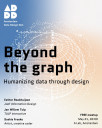
Amsterdam Data Design Den is the city's newest community meetup celebrating the intersection of data, design, and storytelling. In an era where information surrounds us, we believe in the power of creative visualization to transform complex data into compelling narratives that inspire and inform.
Every couple of months, we bring together professional designers, creative studios, and emerging talents in an informal setting to share groundbreaking projects and foster meaningful connections. Our speakers range from established design studios showcasing large-scale data visualization projects to independent designers experimenting with novel approaches to information design.
What makes our meetup unique is its commitment to accessibility and community. There's no entry fee, no membership requirements—just a gathering of curious minds passionate about using design to make sense of our data-driven world. Whether you're a seasoned information designer, a student exploring data visualization, or simply intrigued by the creative possibilities of data storytelling, you'll find your place here.
Join us for an evening of inspiration, networking, and casual conversations over drinks. Each session features thought-provoking presentations followed by open discussions, creating an environment where ideas flow freely and collaborations naturally emerge.
Amsterdam Data Design Den meets in the heart of Amsterdam, bringing together the city's vibrant creative community to explore the future of data visualization and information design.
Vacancy: PhD position on The Organization of Innovation for Sustainability Transition at Vrije Universiteit Amsterdam
Have you obtained a master's degree in social and/or organization sciences, and would you like to study innovation and change? Then consider joining our interdisciplinary team with a PhD research on accelerating sustainability transitions!
This PhD position is part of an interdisciplinary team of three PhD researchers, one postdoc, and two senior researchers in the project ‘EXTRA’: <em>From EXperiment to sustainable change: TRAnsformative methodologies for innovation and learning</em>. EXTRA is a collaboration between multiple universities and public and private partners to research and advance physical and experimental environments as enabling methodologies for learning and innovation, also known as living labs.
Living labs are applied by various change-makers, including governmental actors, industry partners, NGOs, researchers, and citizens, to co-create innovations. However, while much experimentation and innovation occur, achieving long-term systemic change remains difficult. Therefore, the main purpose of EXTRA is to amplify the transformative power of living labs with novel insights, instruments, and human capacities, thus enabling change-makers to make sustainable changes and societal impacts.
In the consortium this PhD research will focus on the organization of innovation to accelerate sustainability transition. More specifically, by gathering knowledge and analyses across different fields and cases, this research will identify and validate (inter)organizational approaches, interventions, and business models to overcome barriers and enable the public-private collaboration needed for embedding, translating, and scaling innovations.
For more information about the project, please visit: https://www.nwo.nl/nieuws/financiering-voor-onderzoeksproject-over-fysieke-experimentele-omgevingen ; https://www.tudelft.nl/2024/bk/nwo-financiering-voor-innovatief-onderzoek-naar-fysieke-experimentele-omgevingen.
Innovation Dinner - Cultuurverandering in de bouw
Op woensdag 26 maart organiseren BouwLab R&Do en 3D Makers Zone vanuit het programma van de EDIH het Innovation Dinner Cultuurverandering in de bouw.
De bouwsector staat op een keerpunt. Jarenlang werd er traditioneel en lineair gewerkt, maar de uitdagingen van vandaag - verduurzaming, digitalisering en circulariteit - vragen om een fundamentele transformatie. Wie niet meebeweegt, blijft achter.
Tijdens deze avond gaan we dieper in op de volgende thema's:
- Van afval naar waarde - Hoe maken we circulair bouwen de norm? Jaarlijks produceert de Nederlandse bouwsector meer dan 20 miljoen ton afval! In een wereld waar grondstoffen schaars worden, is dat onhoudbaar. Innovatieve bedrijven laten zien dat het anders kan. Gebouwen worden gesloopt met een materialenpaspoort, zodat onderdelen een tweede leven krijgen. Prefab houtbouw vervangt traditionele bouw, waardoor woningen sneller, lichter en met een lagere CO2-uitstoot gerealiseerd kunnen worden.
- Digitalisering als versneller - Hoe benutten we AI, digital twins en data? Ook digitalisering speelt een cruciale rol in de modernisering van de bouw. Digital twins, AI en big data kunnen bouwprocessen optimaliseren, terwijl drones en 3D-scans de veiligheid en nauwkeurigheid vergroten.
- <strong>Samenwerken of stagneren?</strong> - Hoe doorbreken we silo's en creëren we ketensamenwerking? Verandering komt alleen tot stand als bedrijven over hun eigen schaduw heen stappen. Ketensamenwerking, waarin partijen niet alleen contractueel maar ook inhoudelijk verantwoordelijkheid delen, is noodzakelijk voor circulariteit en digitalisering. Dat verlangt nieuwe verdienmodellen, waarbij niet alleen de laagste prijs maar de waarde op lange termijn centraal staat.
- Van traditie naar toekomst - Hoe breken we met oude patronen?
🚀 Maak je bedrijf toekomstbestendig met de Circulaire Kansenkaart Noord-Holland! 🌍
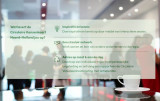
Wil jij als mkb-ondernemer concrete stappen zetten naar een circulaire bedrijfsvoering? Provincie Noord-Holland en Circulair West bieden samen met Route Circulair een GRATIS traject aan voor maximaal 10 bedrijven.
✅ Praktische tools en begeleiding
✅ Inspiratie en kennis via interactieve sessies
✅ Netwerken met andere ondernemers
✅ Persoonlijk advies en actieplan
#aanmelden? Lees verder in dit artikel: https://lnkd.in/eRA5qvAN
Curious about... Taking back society

Power to the people? Jazeker! Actief burgerschap, gemeenschapszin – het is helemaal in. Mensen zijn toe aan verandering en willen een stem hebben in de dingen die belangrijk voor ze zijn. De grote uitdagingen van onze tijd vragen om grote oplossingen en daar willen we onderdeel van zijn. Meer en meer krijgen we dat samen voor elkaar, buiten de gebaande paden, in vernieuwende organisatievormen, of op eigen initiatief – niet langer aan de zijlijn, maar midden in het speelveld. Van samen je eigen droomwoning maken tot het testen van ons collectief vermogen om te delen.
Ontmoet de doeners en makers die de maatschappij terugpakken om de wereld vooruit te helpen. Op 29 januari organiseren A Lab en Vandejong de 5e editie van Curious about... We duiken in nieuwe organisatievormen, nieuwe woonvormen, nieuwe zorgvormen en nieuwe natuur. Er zijn succesverhalen en hobbels op de weg. We ontrafelen hoe geld onze samenleving beïnvloedt, krijgen inzicht en handvatten om onze idealen te verwezenlijken, we leren hoe een initiatief niet wordt overgenomen door kapitaal en hoe niks zorgt voor meer... Bekijk het volledige programma en meld je gratis aan op a-lab.nl.
Basic Intellectual Property Rights training (Free of charge/Dutch spoken) .
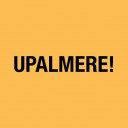
This free of charge training will be given in Dutch!
Protect your ideas and strengthen your competitive advantage with the basic Intellectual Property Rights training.
What will you learn during the training?
- Introduction to different IP rights: get a clear understanding of the IP rights that protect you.
- Real-life examples of collaboration and ownership: Learn how IP rights work in collaborations.
- Freedom to operate: discover how to preserve room to innovate without legal risks.
- The value of technical details in patent publications: Understand how these details give you an advantage in the market.
When: Monday, 9 December 2024 15.30 - 18.00
Location: Ondernemersplein Almere (cityhal Almere), Stadhuisplein 1, 1315HR Almere
Jaarevent C-Creators 2024: Onderweg naar morgen - transitie in beweging 🌍 🔄

Jaarevent C-Creators 2024: Zet de Bouwketen in Beweging
<strong>Datum</strong>: 14 november 2024
<strong>Locatie</strong>: A Lab, Amsterdam
<strong>Tijd</strong>: 14.00 - 17.30 uur (inloop vanaf 13:30, met aansluitende borrel)
<strong>Thema</strong>: “Onderweg naar morgen – Transitie in beweging”
<strong>Beschrijving</strong>: Het Jaarevent 2024 van C-Creators brengt pioniers, beleidsmakers en ketenpartners samen om concrete stappen te zetten richting een circulaire toekomst in de bouw. Tijdens dit inspirerende evenement krijg je de kans om kennis op te doen, te netwerken en mee te denken over de toekomst van circulair bouwen.
Waarom deelnemen?
- Leer meer over de nieuwste innovaties in circulair bouwen.
- Netwerk met gelijkgestemden en ontdek nieuwe samenwerkingsmogelijkheden.
- Ontvang praktische handvatten en inzichten om direct toe te passen.
<strong>Hoogtepunten</strong>:
- 🎤 Keynote van Vincent Luyendijk over duurzame gebiedsontwikkeling.
- ☕️ Stakeholder Cafés over biobased bouwen, houtbouw en hergebruik.
- 🎮 Netwerkspel “Spaar ze allemaal” voor waardevolle connecties.
- 🌍 Interactieve Expo met inspirerende circulaire projecten.
<strong>Voor wie</strong>: Bouwprofessionals, woningcorporaties, architecten, ontwikkelaars, gemeenten, slopers en investeerders.
<strong>Aanmelden</strong>: Deelname is gratis, maar de plaatsen zijn beperkt!
🔗 Meld je nu aan en sluit je aan bij de koplopers in de circulaire bouwsector.
Just.City.Amsterdam.2024

Op 21 november 2024 vindt de tweede editie van Just.City.Amsterdam plaats. Dit jaar richten we ons op een belangrijk thema: rechtvaardigheid in de praktijk brengen. Waar we tijdens de eerste editie verschillende perspectieven op rechtvaardigheid onderzochten, gaan we nu aan de slag met de vraag: Hoe doen we dat?
Wat kun je verwachten?
Vanuit het A Lab in Amsterdam Noord gaan we de wijk in om rechtvaardigheid van dichtbij te ervaren. Samen bezoeken we lokale initiatieven die actief werken aan meer rechtvaardigheid. We kijken naar wat er gebeurt, wat werkt, en wat misschien anders kan. Daarnaast denken we samen na over wat jij zelf kunt bijdragen aan een rechtvaardige stad.
Tijdens Just.City.Amsterdam.2024 ervaar je hoe rechtvaardigheid in de stad wordt toegepast. Sluit je aan bij één van de excursies waarin lokale gemeenschappen hun projecten en uitdagingen delen, en leer meer over hun inzet voor rechtvaardigheid en verandering. Of kies voor een workshop waarin je dieper ingaat op hoe creatieve en praktische methodes bijdragen aan een eerlijker Amsterdam.
Bekijk het aanbod hieronder, meld je aan en doe mee aan het gesprek over een rechtvaardige stad!
- Excursie: Inkijkjes in de Energietransitie - met Tessa Steenkamp
- Workshop: School voor Strijders - met Massih Hutak
- Excursie: Red Amsterdam Noord - met Eva Bollen en Esmee Barel
- Workshop: De maatschappelijke impact van documentaires - met Ester Gould
- Excursie: De Rechtvaardige Stad en Community Wealth Building - met Floris Bremen
- Excursie: Van wie en voor wie is de buurt - Met Bart Stuart
Red Light District Relocation: What do you think? 🤷🤦♀️
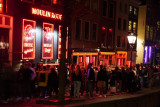
Amsterdam is set to relocate its iconic Red Light District from De Wallen to Europaboulevard, marking a significant shift in the city's approach to sex work and urban development.
This move aims to create a more structured and safe environment for sex workers while addressing concerns about over-tourism and its impact on local communities. We analyzed available data online to understand the hottest topics from affected groups.
<strong>See data insights on Playground Journal. Or listen to a short 5-minute podcast on this here.</strong>
This is your opportunity to engage in the conversation. Your insights and opinions matter in shaping a future that respects the city’s rich history while addressing the challenges and hopes of its diverse inhabitants.
The significance of this relocation lies in its potential to reshape Amsterdam's cultural and social landscape. It reflects the city's commitment to balancing the needs of residents, tourists, and sex workers, ensuring that the new Erotic Centre aligns with contemporary values while preserving the district's historical essence.
As this transformation unfolds, community input is vital. Residents, business owners, and other stakeholders are encouraged to contribute their thoughts and ideas to help shape the future of the new Red Light District. Your insights can influence the new facility's design, amenities, and safety features.
While communities can influence many aspects—such as building design, types of amenities, and community engagement processes—certain elements are fixed. The location of the new RLD has already been determined, as are existing laws and regulations governing sex work. Additionally, the core concept of the Erotic Centre and project timelines remain unchanged.
Let’s ensure that the new Red Light District reflects the values and aspirations of all who call Amsterdam home. Your voice matters!
Reflexive Monitoring course
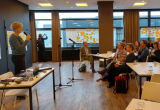
If you're working on system change, you will face plenty of uncertainty and polarisation. The outcome is also unpredictable: we're working on a different future, but we don't know exactly what that will look like. And systems change requires an integrated approach, as different aspects - from technology to politics - have to change simultaneously. So in transitions, merely setting and hitting targets won't do.
This 3-day, Dutch-language course introduces you to valuable knowledge, tools and approaches, aimed at learning and adapting in transitions – for all transition makers who want to improve their monitoring game. It's taught by Barbara van Mierlo, associate professor at Wageningen University & Research and a founder of the methodology 'Reflexive Monitoring in Action' as well as PJ Beers, senior researcher at DRIFT and lecturer at HAS Green Academy.
Sign-up for 2025 is now open.
Lectures on the development of systems that process and analyze huge amounts of data
AI requires the development of database systems that are able to process and analyze huge amounts of data in a fast and efficient way. CWI researchers play a pioneering role in the development of such database architectures, and have attracted international datawarehouse companies to Amsterdam.
One of those pioneers is Marcin Żukowski, who co-developed a database management systems that had great societal impact and is used by tech giants to this day. He is the co-founder of software company Snowflake, a Silicon Valley based company that offered the first cloud-based data warehousing service that is truly designed for the cloud. Snowflake uses vectorized query execution and lightweight compression methods in its columnar data storage, two techniques that were co-designed by Żukowski during his PhD years at CWI.
For this achievement Żukowski will receive the Dijkstra Fellowship on 21 November at CWI. This fellowship is awarded once in every five years by CWI. This day is also filled with lectures on the topic of the architecture of data processing and analysis systems.
Accelerator Programme Culture & Creativity
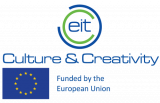
The European Innovation and Investment Agency for Culture and Creativity launches its first accelerator programme for 2024-2025.
It focuses especially SMEs and Scale-Up which want to grow in global markets.
Participants will benefit from an 8-week acceleration programme led by top European speakers, trainers, and mentors, valued at €20,000. This intensive programme will provide you with expert guidance, hands-on workshops, and invaluable connections within the industry. Also, an in person programme in our six regional innovation hubs in Amsterdam, Barcelona, Bologna, Helsinki, Kosice and Vienna is possible.
Participation in the programme is free of charge!
The acceleration programme is also a route to joining the EIT CC partnership with purpose and to win at a later stage in EIT Culture & Creativity as strategic long term partner, investor and/or shareholder.
Application Deadline: 4 October.
How to apply?
Application information here: Accelerator Programme – EIT Culture & Creativity (eit-culture-creativity.eu)
Who Should Apply?
We’re looking for creative SMEs or scale-ups (minimum 3 years old) in industries such as:
– Fashion
– Architecture
– Cultural Heritage
– Audiovisual Media and Gaming
– Innovative businesses combining elements from these sectors, or leveraging the latest digital or circular technologies.
Key Requirements
– An innovative business idea with potential for global impact
– A strong drive to succeed combined with an openness to adopting new business models
– Demonstrable growth and turnover (with a minimum annual average of 5% sustained over the past 2 years
What’s in it for your company?
Your company will benefit from an 8-week acceleration programme led by top European speakers, trainers, and mentors, valued at €20,000. This intensive programme will provide you with expert guidance, hands-on workshops, and invaluable connections within the industry.
You’ll also build a strong network of peers and professionals while enhancing your business model. And you’ll also have the chance to be featured on our prestigious “100 to Watch” list!
Embassy of Digital Futures: Balanceren tussen Utopie en Dystopie

Embassy of Digital Futures organiseert een expositie op de Dutch Design Week 2024 over superpowers & escaping the algorithm. Op de conferentie: “Balanceren tussen Utopie en Dystopie” gaan we op zoek naar handelingsperspectief.
Er is de laatste tijd veel aandacht voor de polarisatie, mentale gezondheid van jongeren en de toenemende invloed van de big tech. De Embassy of Digital Futures gaat in op de vraag hoe we de ontwikkeling van digitale toekomsten kunnen beïnvloeden. Deze toekomsten bieden een beeld van hoop en nieuwe mogelijkheden. Er komen ‘superpowers’ tot onze beschikking! Deze superpowers hebben echter ook een keerzijde.
Onder het motto "Escape the algorithm" zoeken we naar het handelingsperspectief en verkennen we de ingrediënten voor de volgende vraag in onze zoektocht naar digitale toekomsten.
Na een presentatie van o.a. Koert van Mensvoort verdiepen we ons in de expo van ontwerpers; Julia Janssen, Leonore Snoek, Mayra Kapteijn en Bas Sala waarna een paneldiscussie volgt met onder meer Martijn de Waal, Marcel Thaens en Mieke van Heesewijk.
Klik hier voor meer informatie over de programma’s rondom de Embassy of Digital Futures
EIT Culture & Creativity is hiring Business Developers
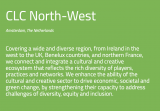
We're Hiring Business Developers in the Cultural & Creative Industries.
Are you a business developer with a network in the cultural creative industries?
EIT Culture & Creativity (EIT CC) is the Knowledge and Innovation Community (KIC) of the European Institute of Innovation and Technology (EIT) for the Cultural and Creative Sectors and Industries.
By fostering interdisciplinary and cross-sectorial collaboration for stakeholders from education, innovation, research, business and culture, EIT CC provides new connections and unique opportunities from its European innovation community across 15 sectors and 30 nations. Its purpose is to help all players in the European Cultural and Creative Sectors and Industries to turn innovation into impact.
We envision to improve competitiveness, resilience and sustainable economic growth of the CCSI by fundamentally changing our collective understanding of entrepreneurship.
Stay up to date
Get notified about new updates, opportunities or events that match your interests.

